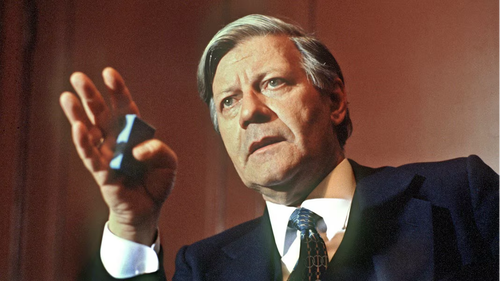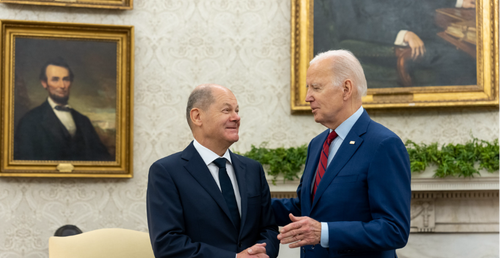Submitted by Rene Zittlau
Introduction
If you look at the current situation with a cool eye, you can only wonder how a country that set cultural, scientific and industrial standards until 90 years ago could completely lose its compass.
First it was destroyed by Hitler – the Germans allowed this to happen. Then Germany became a vassal – the Germans allowed that to happen. Finally, they managed to drive the former industrial jewel of the world to the wall with the most incompetent leadership you could dream of. A new government with Merz as Chancellor will do nothing to change this, as he has already been bought and paid for by the hegemon.
This article is therefore not about the political kindergarten in Berlin, which can hardly be put into words, but attempts to describe the fundamental problem of this great country and provide food for thought.
A look back – the emergence of the FRG
“We in Germany have not been fully sovereign at any time since May 8, 1945.”
Wolfgang Schäuble’s statement, which surprises many in its clarity and unambiguousness, as well as the vassal status of Germany articulated therein, is substantiated, among other things, by the history of the creation of the highly praised Basic Law. It was drawn up by so-called Parliamentary Councils. The councils were appointed by the Western occupying powers and convened in the Museum König in Bonn on September 1, 1948. This meant that the members were by no means democratically legitimized. They were entrusted with the task of drawing up a provisional constitution for the western part of the divided Germany, which later became the Basic Law.
The process of the final secession of the western occupation zones and the subsequent creation of a partial West German state began with the start of the work – the framework of which was defined by the “London Recommendations” of the western occupying powers.
The Basic Law was thus created on the express instructions of the Western occupying powers. In addition to the requirements of the “London Recommendations”, they repeatedly convened the so-called Parliamentary Councils to monitor their work and make amendments in their interests – 36 times in total.
The Basic Law was signed on May 8, 1949. On May 23, 1949, it came into force for the German states under the control of the Western Allies, the later federal states.
The German Basic Law is therefore not German at all, but a decree whose content was determined by the occupying powers. The fact that even the members responsible for implementing the Basic Law were also appointed by the occupying powers is testimony to this.

In September 1949, the unelected Parliamentary Council was constituted as the Provisional Bundestag of the German states under the control of the Western Allies in the Museum König in Bonn. This enacted the provisional constitution drawn up under the strict supervision of the Western Allies as the Basic Law of the Federal Republic of Germany.
An unelected body appointed by the occupying powers thus introduced a non-German Basic Law, which was elevated to the status of a constitution and is still in force almost 80 years later. Truly not a democratic start for a country that was preparing to become sovereign.
The relationship between feudal lord and vassal is a very good description of the relationship between the Western occupying powers and the FRG. For a fiefdom is a landed property granted on condition of consideration.
A state born under such conditions can only achieve full independence and sovereignty if it completely removes the limiting circumstances. The FRG did not succeed in doing so either before 1990 or afterwards. Article 146 of the Basic Law contains a provision that could have been applied immediately, at least after 1990. It states:
“This Basic Law, which shall apply to the entire German people after the completion of the unity and freedom of Germany, shall cease to be valid on the day on which a constitution comes into force which has been freely adopted by the German people.”
If German constitutional lawyers and judges, renowned for their precision and legal acuity, have been unable to compel parliament to implement this article, it is a matter worthy of profound reflection.
Striving for independency until 1990
One has to give the political class of the old FRG, i.e. the one before 1990, credit for producing personalities who repeatedly resisted the attempts of their Anglo-Saxon overlords to exert influence, and did so quite successfully. These include Willy Brandt, Helmut Schmidt and Helmut Kohl.
Helmut Schmidt, Federal Chancellor 1974-1982, was still able to hold his own against the American President Jimmy Carter. In connection with the construction of a gas pipeline to Russia, which ran counter to American interests, he called President Carter a “peanut farmer” in an eloquent and self-confident manner and forbade American influence – with success.

Weakening to ingratiation from 1990 onwards
After 1990, political and above all human qualities in this regard were only to be found sporadically and in contradictory forms. It was and is evident that the subordination of chancellors and thus of Germany’s political leadership to foreign interests has gradually increased since then. When Angela Merkel took office, Germany’s unquestioning subordination to American and other foreign interests was practically elevated to the status of raison d’état. Nuclear and coal phase-outs, the green agenda, migration, gender and LGBTQ issues, Russia sanctions, the war in Ukraine, the Middle East conflict – all of these issues were introduced into the German political debate from outside. The way they were then dealt with in Germany primarily played into the hands of interest groups outside Germany. The negative trend culminated in the person of Olaf Scholz. Under his aegis, even the last German interests were abandoned.
Olaf Scholz failed to comply with the duty to “avert harm from the German people”, part of the oath of office under Article 56 of the Basic Law: 45 years after Schmidt, this still-Chancellor had the Nord Stream pipeline blasted out from under his butt and remained silent; we refer to our article from February 15, 2023 “The silence of the lambs: Nord Stream blasting – an act of war by the USA – the West remains silent”.

The end of the traffic light government
On November 6, Chancellor Olaf Scholz dismissed his FDP Finance Minister, thus announcing the end of the “traffic light government”.
When announcing what had been inevitable for weeks and months, the head of government, Olaf Scholz, appeared to be controlled by others, as if not of this world. His voice, body language and facial expressions were completely inappropriate to the situation and in no way befitting of a statesman. It was a petty bourgeois in fear of his own sinecure speaking and not a chancellor concerned about the state and its citizens.
Olaf Scholz, unable to cope with the situation, gave free rein to his personal animosities towards his colleague Christian Lindner in a way that is probably unprecedented in the history of the Federal Republic of Germany. In doing so, Olaf Scholz showed the world that his personality was already completely out of his depth and that he was in no way up to the task of holding a leading state office.
Parallel, uncoordinated economic summits between the Chancellor and the Minister for Economic Affairs, at which both revealed their incompetence in economic matters, were unable to calm the situation – and how could they? After these days of “amazement and wonder”, there was finally a showdown between the Chancellor and the Finance Minister.
While Olaf Scholz lashed out at his dismissed finance minister as if in a personal furor, the latter showed the composure befitting his office in his subsequent statement and gave reasons for his actions that everyone could understand.
Among other things, the Chancellor insisted on gigantic aid for Ukraine. He intended to impose this obviously planned abuse of the debt brake on Christian Lindner. The latter opposed this and regarded such a course of action as a breach of the oath of office and accused the Chancellor of complete ignorance of economic contexts.
The impromptu appearance by Economics Minister Habeck put paid to the credibility of this triumvirate. Habeck’s appearance made it clear that the context of his colleagues’ debate was beyond his intellectual horizon.
Conclusion
Whether the political events in the USA had an influence on events in Berlin is not apparent and is also not relevant. The economic, financial and political problems of the Federal Republic, which are the causes of the government crisis, existed independently of the American election results. They could only culminate in this way because of the completely incompetent government leadership. The future exacerbation of these problems is already conceivable.
The sovereignty of a state is not a value in itself. It is the basis for everything, for state, national and therefore political independence, a conditio sine qua non. If sovereignty exists, it produces sovereign, self-confident citizens. Sovereign citizens do not grow on trees, they are the result of sovereign upbringing at home and comprehensive education from kindergarten to university. Sovereign citizens create social organizations, parties, which in turn create state institutions in which self-confident, sovereign citizens bring the interests of the community to bear; the interests of their own community, not the interests of foreign powers.
Only an independent policy based on the full sovereignty of the state and exclusively oriented towards its own national interests could have prevented the FRG from getting into such a catastrophic situation in the first place. One feels transported back 200 years when Heinrich Heine proclaimed in his thoughts on Germany:
“At night I think of Germany,
And then all slumber flies from me.”– Heinrich Heine in “thoughts at night”
Loading…











